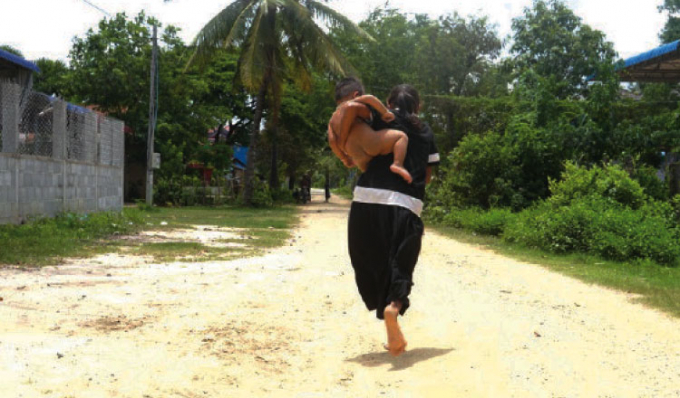October 11, 2025 | 11:55 GMT +7
October 11, 2025 | 11:55 GMT +7
Hotline: 0913.378.918
October 11, 2025 | 11:55 GMT +7
Hotline: 0913.378.918

A woman carries her naked child in an impoverished Cambodian village. Photo: KT
Countries have responded to the Covid-19 pandemic and the economic crisis by stepping up spending, but the trajectories of their debt burdens have diverged as only some nations have benefited from ultra-low interest rates, a study by credit insurance firm Euler Hermes has found.
A decade ago around 6 percent of government spending in both rich and poor nations was going towards interest on their public debt.
But for advanced economies it fell to around 4 percent in 2020, while for emerging markets it rose to 7.3 percent and for low-income developing countries it shot up to 13.7 percent.
Euler Hermes estimated low-income countries will need a minimum of $450 billion to step up their response to Covid-19 as well as maintain their finances to avoid long-term damage to their economies.
“In the absence of a comprehensive solution, heavy debt burdens may generate a permanent global divergence between rich and poor countries,” the report warned.
Euler Hermes said that while the international community was likely to help countries facing difficulties no overall debt resolution mechanism was likely to emerge.
But it said the proposal for an African “New Deal” that could see advanced countries step up aid to the continent would offer a viable solution.
The plan would seek to have a considerable amount of the $650 billion in International Monetary Funds funds that are to be released to member states be directed to Africa.
Euler Hermes also identified countries that are most vulnerable to sovereign debt stress.
South Africa, India, Brazil and Pakistan are among the top among emerging nations at most risk, although Euler Hermes believes they should be able to avoid defaulting because their debts are mostly held domestically and can be extended.
But Egypt is a worrying case because 39 percent of its debt is in foreign currencies and payments due in 2021 and 2022 amount to 15 percent of gross domestic product (GDP), said the company.
Iran, Kenya, Nigeria, the Democratic Republic of Congo, and much of Central Asia also made the list of vulnerable countries – as did Angola, which lost access to international debt markets in 2018, enjoys a temporary freeze in payments to G20 nations and is negotiating with China to lower its debt payments.
China is now the major official creditor to emerging and developing nations, with a third of them owing Beijing more than 5 percent of their GDP.
AFP

(VAN) The Vietnam Veterinary Science and Technology Association held a thematic workshop titled 'Update on African Swine Fever - Biosecurity solutions for disease prevention.'

(VAN) Through innovative lessons, pedagogy students are gradually spreading disaster prevention and response skills to every student, every family, and every community.

(VAN) The infrastructure support project for high-quality rice areas will have special financial mechanisms to invest in irrigation works and technology transfer.

(VAN) Vice President Kaja Kallas acknowledged Vietnam’s significant progress in combating IUU and announced that an EU IUU inspection team will visit to conduct work in November 2025.

(VAN) Sponsored by UNIS Hanoi, the Gaia Earth installation will be open to the public from 29 October to 1 November.

(VAN) Acting Minister Tran Duc Thang received the Finnish Ambassador and agreed to promote the signing of a MoU on cooperation in environment and hydrometeorology on the occasion of General Secretary To Lam’s visit.

(VAN) Under the DRRP mechanism, partners will deliver assistance to the most affected areas and vulnerable groups, starting with a comprehensive risk assessment.